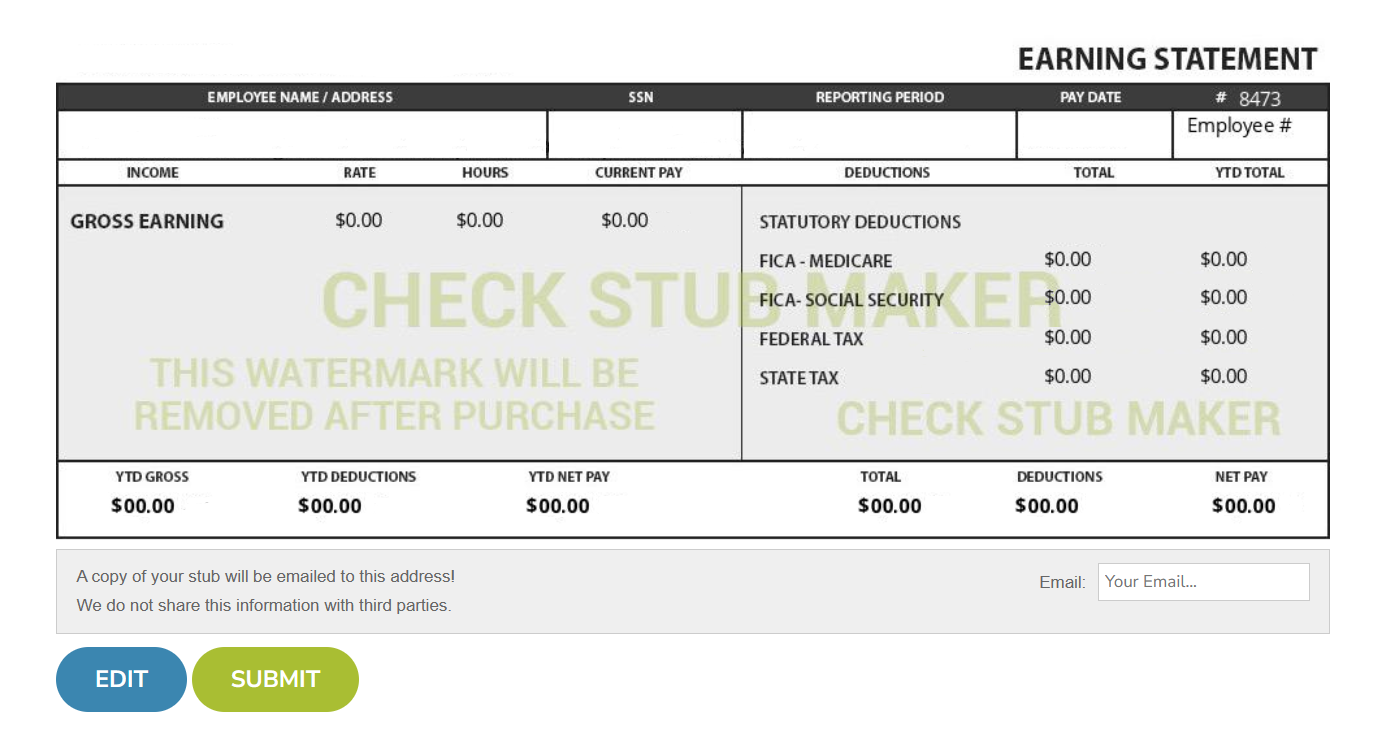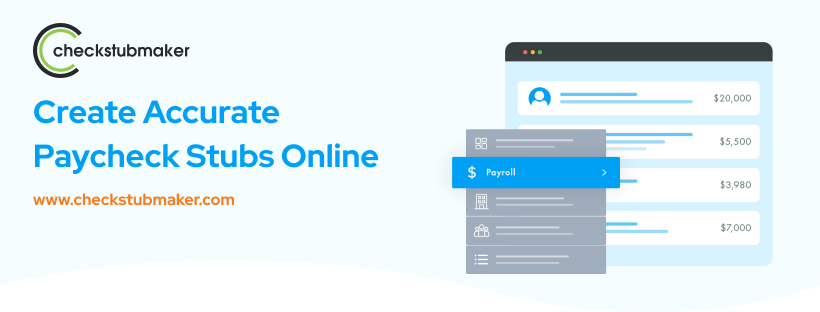At Check Stub Maker , we understand the significance of pay stub deductions in managing finances effectively. If you're wondering, ‘ What are deductions on pay stub ?', they encompass taxes, insurance, and contributions, playing a pivotal role in reflecting your earnings. Tracking them efficiently ensures financial clarity for both employers and employees. Our expertise lies in simplifying this process. With our user-friendly pay stub creator , you can effortlessly comprehend your deductions every step of the way. In our upcoming article, we'll delve into the intricacies of various deductions that typically appear on pay stubs and how to calculate them using our digital platform. Let's get started! What this article covers:
What Are Payroll Deductions?
Payroll deductions refer to the amounts withheld from an employee's paycheck by their employer to cover various costs, including:
- taxes
- insurance premiums
- retirement contributions
- other benefits
As per our expertise, these deductions are essential for ensuring compliance with tax regulations and facilitating enrollment for numerous workplace benefits. Understanding payroll deductions is also crucial for employees to accurately assess their take-home pay and plan their finances accordingly. At Check Stub Maker, we recognize the importance of clarity in payroll deductions. Our analysis revealed that our pay stub generator allows employees to comprehend and track their deductions effortlessly. Now, you can ensure accuracy in your finances and make informed decisions about your spending and saving habits using our digital platform.
How Do Payroll Deductions Work?
Payroll deductions work by withholding specific amounts from an employee's paycheck to cover various expenses such as taxes, insurance premiums, retirement contributions, and other benefits. Drawing from our experience, these deductions are determined by factors like the:
- employee's salary
- tax filing status
- any additional withholdings they may have chosen
The deducted amounts are then listed on the employee's pay stub, providing a detailed breakdown of where their money is allocated. That's why we're committed to creating clarity in our check stubs , so you can understand your deductions better, learn how to change withholding on paystub , and manage your finances effectively.
Pretax Deductions
Pretax deductions are amounts withheld from an employee's paycheck before taxes are calculated. These deductions can include contributions to retirement plans, health insurance premiums, and flexible spending accounts (FSAs). By deducting these amounts before taxes, employees may lower their taxable income, potentially reducing their overall tax liability. This can lead to significant savings over time. At Check Stub Maker, we ensure that paycheck stubs display pretax deductions, helping you understand how these deductions impact your take-home pay and tax obligations every year.

Statutory Deductions
Let's look at the most common types of statutory deductions on pay stubs. Table: Statutory Deductions
Statutory DeductionsDescriptionExampleFICA Taxes- Federal Insurance Contributions Act taxes fund Social Security and Medicare
- 6.2% Social Security tax on income up to $170,000
- 1.45% Medicare tax on all earnings
Federal Income Tax- Compulsory deduction imposed by the federal government based on income level, filing status, and W-4 allowances
- Withholding based on IRS tables
- Varies and is determined by income and deductions
State And Local Taxes- Mandatory deductions levied by state and local governments
- Withholding based on state and local tax rates and employee earnings
- Varies by employee location and tax rates
Social Security- Funds the federal Social Security program, with contributions from both employees and employers
- Employee and employer make contributions of 6.2% each (12.4% in total)
- SS contribution has an income limit
Medicare- Funds the federal Medicare program
FICA Taxes
A common deduction on a person's pay stub would be the Federal Insurance Contributions Act taxes, or FICA, for short. They're mandatory deductions from employees' paychecks that fund Social Security and Medicare programs. FICA taxes are divided into two parts:
Social Security tax is levied at a flat rate on income up to a certain threshold (about $168,600), while Medicare tax is assessed at a flat rate on all earned income.
Federal Income Tax
A FIT deduction on paystub is compulsory and imposed by the federal government on employees' earnings. The amount withheld for federal income taxes depends on several factors, including your:
Based on our observations, employers use withholding tables provided by the IRS to determine the appropriate amount to withhold.
State And Local Taxes
State and local taxes are mandatory deductions levied by state and local governments on employees' wages. These taxes and the amount withheld vary depending on the employee's location and the applicable tax rates set by state and local authorities.

Social Security
Social Security tax is a type of pay stub of workmen compensation deduction that funds the federal government's Social Security program. It's levied on employees' earnings up to a specified annual income limit. Our investigation demonstrated that the current Social Security tax rate is set at 6.2% for employees, with employers matching this contribution, making the total amount 12.4%.
Medicare
Medicare tax is a compulsory deduction that funds the federal government's Medicare program, which gives medical assistance to eligible individuals, such as:
- people over 65 years of age
- younger people with specific disabilities
- people suffering from End Stage Renal Disease (ESRD)
A medicare deduction on paystub is levied at a flat rate on all earned income, and has no income limit. The current Medicare tax rate is 1.45% for employees; employers match with an equal contribution, which comes to 2.9% overall. These statutory deductions are essential components of employees' paychecks, ensuring funding for vital government programs such as Social Security and Medicare. At Check Stub Maker, we provide clear and detailed pay stubs that reflect these statutory deductions, helping you understand your financial obligations and plan accordingly.
Post-Tax Deductions
Wage Garnishments
Wage garnishments are court-ordered deductions from an employee's paycheck to satisfy debts such as:
- child support
- unpaid taxes
- creditor judgments
Our practical knowledge shows that these deductions occur after taxes are calculated and withheld, impacting the employee's net pay. Garnishments are typically a fixed percentage of the employee's disposable income that are subject to legal limits. They can significantly affect an employee's take-home pay and economic stability. We at Check Stub Maker ensure accurate calculation and documentation of wage garnishments on our paystubs , helping employers and employees navigate these deductions consistently and efficiently.

Voluntary Deductions
Next, we'll look at examples of common voluntary deductions on paystub . Table: Voluntary Deductions
Voluntary DeductionsDescriptionExamplesHealth Insurance- Voluntary payments made by employees to cover healthcare costs
Group-Term Life Insurance- Employee contributions towards life insurance coverage provided by an employer
- Premiums for group-term life insurance
Retirement Plans- Employees make contributions to retirement plans
- 401(k)
- Individual Retirement Account (IRA)
Flexible Spending Accounts (FSA)- Pre-tax funds set aside by employees for eligible medical or dependent care costs
- Medical assistance
- Childcare expenses
Job-Related Expenses- Voluntary deductions for expenses incurred for work-related purposes
- Union dues
- Professional memberships
Health Insurance
Health insurance deductions are voluntary payments made by employees to cover their healthcare costs. These deductions typically contribute to premiums for medical, dental, and vision coverage. They provide financial security by offsetting medical costs for employees and their dependents. At Check Stub Maker, we provide succinct documentation of health insurance deductions on pay stubs, helping you track your healthcare plans effectively and understand your coverage.
Group-Term Life Insurance
Group-term life insurance deductions involve voluntary contributions towards life insurance coverage provided by an employer. These deductions offer monetary protection to employees' beneficiaries in case of death. Based on our first-hand experience, the premium amount is calculated according to factors such as:
- age
- salary
- coverage amount
We assist employers and employees in accurately reflecting group-term life insurance deductions on their pay stubs, ensuring transparency and understanding of coverage details throughout.
Retirement Plans
Retirement plan deductions entail voluntary contributions to retirement savings, such as a 401(k) or IRA on paystub . These deductions help employees save for their future monetary security by investing a portion of their income. These deductions may be pre-tax or post-tax, ultimately affecting the taxable income and eventual retirement savings. After trying it out, our paystub maker includes precise calculations of retirement plan deductions, empowering you to monitor your savings progress any time you like.

Flexible Spending Accounts
Flexible spending account (FSA) deductions allow employees to set aside pre-tax funds for eligible medical or dependent care expenses. These deductions reduce taxable income and provide tax benefits for employees. FSAs offer flexibility in managing healthcare and childcare costs, enhancing financial planning and budgeting. At Check Stub Maker, we facilitate efficient reporting of FSA deductions on our pay stubs, ensuring that employees are always aware of their available funds and able to utilize them effectively.
Job-Related Expenses
Job-related expense deductions involve voluntary contributions towards costs incurred for work-related purposes, such as:
- union dues
- professional memberships
- work uniforms
- parking services
These deductions may vary based on job requirements and employee agreements. By detailing job-related deductions on pay stubs, we at Check Stub Maker can assist you with carefully tracking your expenses and understanding your monetary obligations every step of the way.
How to Calculate Payroll Deductions
Payroll Deductions Calculator
With Check Stub Maker's intuitive payroll platform, you can effortlessly create pay stubs , calculate deductions, and ensure financial transparency. Here's how to get started:
- Gather Information: Collect essential details such as gross pay, tax withholdings, and voluntary deductions from the employee's pay stub or paycheck.
- Access Pay Stub Generator: Visit Check Stub Maker to access our pay stub generator, then input the required information into the designated fields.
- Calculate Deductions: Enter the gross pay and other relevant details into our generator. It will automatically compute various deductions, including taxes, insurance premiums, and retirement contributions.
- Review Results: Once all the information is entered, review the calculated deductions to ensure accuracy and make edits if needed. Our built-in calculator provides detailed breakdowns, making it easy to understand each deduction.
- Generate Pay Stub: If you're happy with the calculations, you can click ‘Submit', make payment, and generate a comprehensive pay stub instantly.
By utilizing our paystub creator , you can streamline your payroll processes, minimize errors, and ensure the receipt of accurate compensation for your tax deductions. 
Paychecks FAQ
How Are Payroll Deductions Reported?
Payroll deductions are typically reported on paystubs like ours at Check Stub Maker, which provide a detailed breakdown of earnings and deductions for each pay period. These deductions may include taxes, insurance premiums, retirement contributions, and other withholdings.
What Are Examples Of Incorrect Payroll Deductions?
Incorrect payroll deductions may occur due to errors in calculation, misclassification of employees, or unlawful deductions. Examples include:
- deducting more taxes than required
- unauthorized deductions for uniforms or tools
- failing to deduct mandatory taxes or benefits
Through our trial and error, we discovered that incorrect deductions can lead to legal issues and employee dissatisfaction, which can negatively impact workplace morale.
What Is The LTD Deduction On Paychecks?
The Long-Term Disability (LTD) deduction on paychecks refers to premiums deducted to long-term disability insurance coverage. LTD insurance provides income replacement benefits to employees who are unable to work due to a qualifying disability for an extended period (usually more than six months). The deduction amount varies based on factors such as the:
- coverage level
- employee's salary
LTD deductions help employees mitigate financial risks associated with long-term disabilities and ensure economic stability during challenging times. 
Conclusion
In our exploration of pay stub deductions, we've decoded the intricacies of different deductions found on pay stubs, empowering you to calculate them with precision. Try our paystub creator today and experience the convenience firsthand. With us at Check Stub Maker , managing deductions becomes a breeze. So, what are you waiting for? Start optimizing your payroll process now! If you want to learn more, why not check out these articles below:











